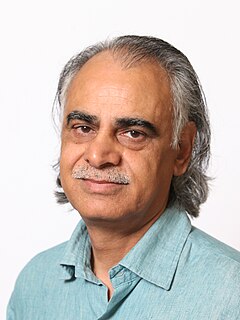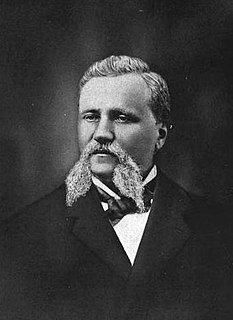Futurology refers to Futures Studies. It might also refer to:
Futurology refers to Futures Studies. It might also refer to:
Futurism is an artistic and social movement that originated in Italy in the early 20th century.

Ziauddin Sardar is a British-Pakistani scholar, award-winning writer, cultural critic and public intellectual who specialises in Muslim thought, the future of Islam, futurology and science and cultural relations. The author and editor of more than 50 books, Prospect magazine has named him as one of Britain's top 100 public intellectuals and The Independent newspaper calls him: 'Britain's own Muslim polymath'.
Futurists are people whose specialty or interest is futurology or the attempt to systematically explore predictions and possibilities about the future and how they can emerge from the present, whether that of human society in particular or of life on Earth in general.

Futures studies, futures research, futurism or futurology is the systematic, interdisciplinary and holistic study of social and technological advancement, and other environmental trends, often for the purpose of exploring how people will live and work in the future. Predictive techniques, such as forecasting, can be applied, but contemporary futures studies scholars emphasize the importance of systematically exploring alternatives. In general, it can be considered as a branch of the social sciences and an extension to the field of history. Futures studies seeks to understand what is likely to continue and what could plausibly change. Part of the discipline thus seeks a systematic and pattern-based understanding of past and present, and to explore the possibility of future events and trends.

In futurology, especially in Europe, the term foresight has become widely used to describe activities such as:
Dale Carrico is an American critical theorist and rhetorician. He is a critic of futurology and geoengineering.
Esli was a Russian science fiction literary magazine. It was started in 1991 in Moscow, as a publisher of foreign SF stories, but soon broadened its format to include Russophone writers as well. In the 2000s, Esli also started publishing fantasy short stories and articles on futurology.

David Goodman Croly was an American journalist, born in New York City and educated at New York University. He was associated with the Evening Post and the Herald (1854–58), and then became an editor and subsequently the managing editor of the World. He married Jane Cunningham, known as "Jennie June", in 1856. In 1863, during the Civil War, he co-authored the anonymous pamphlet Miscegenation, which tried to discredit the abolitionist movement and the Lincoln Administration by playing on racist fears common among whites. The anonymous author of the pamphlet claimed to be an Abolitionist in favour of promoting the intermarriage of whites and blacks, a taboo practice that at the time was seen as a threat to white supremacy. The pamphlet coined the term miscegenation for the intermixing of races.
Speculative art can refer to:
Mac Tonnies was an American author and blogger whose work focused on futurology, transhumanism and paranormal topics. Tonnies grew up in Independence, Missouri, and attended William Chrisman High School and Ottawa University. He lived in Kansas City, Missouri. Tonnies had an active online presence and a "small, but devoted" readership, but supported himself by working at Starbucks and other nine-to-five jobs. In 2009 he died of cardiac arrhythmia at the age of 34.

Futurology is the twelfth studio album by Welsh rock band Manic Street Preachers. It was released on 7 July 2014, through record label Columbia. The album features collaborations with Green Gartside, Nina Hoss, Georgia Ruth, Cian Ciaran and Cate Le Bon.

"Walk Me to the Bridge" is the first single released by the Manic Street Preachers from the album Futurology. The single was planned for release on 28 April 2014, but it was leaked earlier in the month.

Hello Internet is an audio podcast hosted by educational YouTube content creators Brady Haran and CGP Grey. The podcast debuted in 2014 and released 136 numbered episodes and 18 unnumbered episodes until February 2020, when the last episode was published. The podcast is currently indefinitely suspended and inactive. Listeners of the podcast are known as "Tims". The episodes of the podcast are usually about the interests of the creators and the differences between the hosts' lifestyles.
Future technology-related topics include:

Science Fiction and Futurology is a monograph of Stanisław Lem about science fiction and futurology, first printed by Wydawnictwo Literackie in 1970.

"Futurology" is the second single released by the Manic Street Preachers from their twelfth studio album, Futurology. The song features keyboards from Super Furry Animals member Cian Ciaran. The single was released on 22 September 2014. It is a duet between James Dean Bradfield, the main vocalist, and Nicky Wire, the band's bassist.
Power Shift or Powershift may refer to:
Ossip Kurt Flechtheim was a German jurist, political scientist, author, futurist, and a humanist. He is credited with coining of the term "Futurology".

Microworlds: Writings on Science Fiction and Fantasy is a 1984 book by Polish author Stanisław Lem, a collection of his essays on the genres of science fiction and fantasy in general, as well as about specific authors and their works. It is edited by Franz Rottensteiner and published in the United States by Harcourt Brace & Company. The book is a selection of previously published translations of Lem's essays.
In futurology, political science, and science fiction, a post-work society is a society in which the nature of work has been radically transformed.